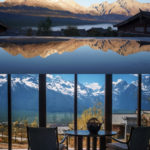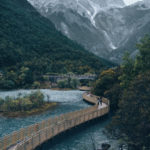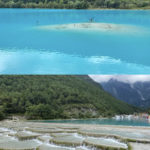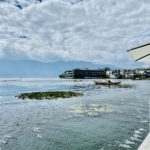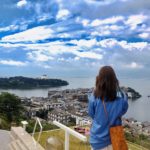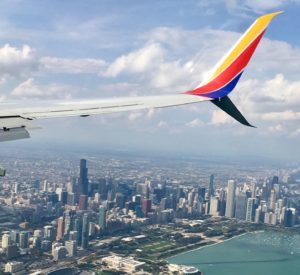December 1, 2018
8 hours and 20 minutes until Vienna. I’ve never been on an airplane where they say everything in Dutch before English. I laugh at my own shallow view of the world.
I am sipping on a new drink called Almdudler, flirting with my flight attendant. I suspect we both may be gay; this flirting is not the type to take you home but rather a friendship that bonds over an unspoken truth. He asks me my age and I stumble over saying I am 19. “It’s an international flight dear, you can drink here”, he laughs at me, dances off and brings me a glass of red wine. He teaches me to say thank you, I stutter “dank-a-sha”. We laugh more, this time I feel light and bubbly, not so afraid of my platonic lover.
I step off the airplane and into Grace’s arms. We are both exhausted. Now, from Vienna, my best friend and I will travel down to the end of the Earth—Cape Town. A five-hour layover breezes by.
On flight number two I blink in and out of sleep. In this foreign place people gather in the cabin, drinks in hand, laughing in languages I can’t quite make out. As I move down the aisle, strangers smile and greet me as I stumble to explain I only speak English. They switch over in seconds like its second nature. They are happy to speak in any tongue. I question my own identity, how am I surrounded by all these humans who hold so much knowledge? What limits have been placed on me from the place I call home?
I fade in and out and wake up to the bluest pool. The fog is rolling in over Table Mountain, palm trees line the sky. Night owls don’t often see 6am, but jet lag has shown me a little travelers magic.
Hours later I trudge up that same mountain from my morning view. My group speeds ahead of me, even Grace has left me far behind. I didn’t realize I was so out of shape, though I try to tell myself it’s okay. I’ve come here to reconnect with myself, to rediscover who I am. So perhaps a trek up a mountain alone will be good for my head.
As I reach the peak I scan across the hazy ocean and gawk at the city scape. How foolish us Americans are, categorizing Africa as one massive impoverished desert. Despite poverty, Cape Town is one of the most developed and cherished cities in the world. I silently confront my ignorance once again.
A top of the mountain we sit for a lecture, today we are focusing on wealth inequality. A question is posed: is it ethical to drive a Bugatti, one of the most expensive vehicles on the market, flying down a freeway that passes by tin homes where people have nearly nothing? I rephrase the question in sorts: is it ethical for us to spend thousands flying across the country, dressed in our Patagonia and Lululemon, only to walk down the streets to “study” the lives of those who have less than us?
As the week passes by, this question circles through my head. I am in this space, speaking to people who have lived through the Apartheid, a horror I have only learned about through textbooks. During my wine tasting the South African man cautions us, “please, don’t worry about our problems, we are going about healing just fine. We don’t need your American meddling, or so you call it, ‘help’.” South Africa’s world class and exceptionally inexpensive wine is a direct result of the aftermath of the Apartheid. I enjoy this drink with ease at the hands of someone else’s suffering, yet, these people don’t want my help. This is the death of my American Ego. My sip that follows is much larger.
On this plane ride home, my feet feel heavy. Grace carries her bag like its weightless, I am uncertain she carries the same lessons home as me. I think, this trip has been about me entirely, and also, not at all. 18 hours till I’m home and I am starting to feel small. It was my first time out of the country, and I feel ignorant, but I guess not so ignorant anymore. I wonder what it means to call the United States home. I wonder how I’ll walk off this airplane and live my life knowing that after all, we are were not all that.

